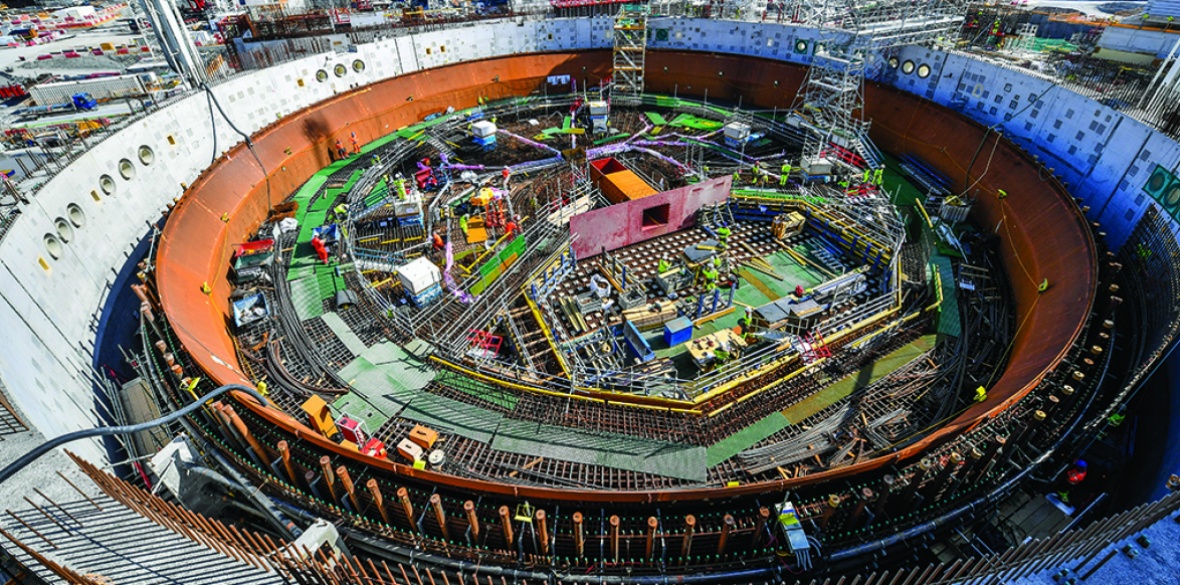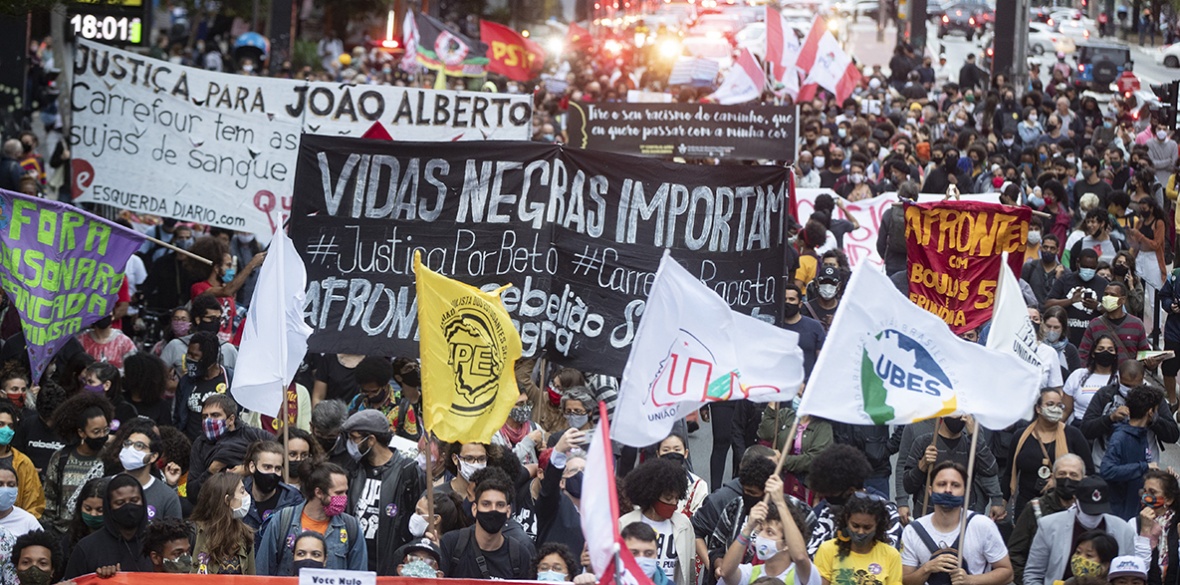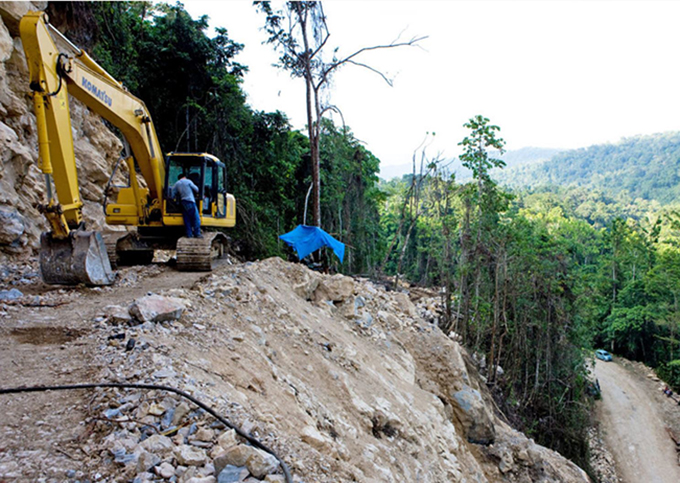Updated Nov 21, 2020; Posted Nov 20, 2020

Maria Garcia, left, hosted a Don't Shoot Portland press conference in 2017 at Revolución Coffee downtown, with Teressa Raiford (center). Garcia, who is Mexican-American, is suing for access to a state relief fund for Black Oregonians. (Raiford and Don't Shoot PDX are not parties to the litigation.) Mike Zacchino/The Oregonian LC- Staff
By Mike Rogoway | The Oregonian/OregonLive
The Mexican-American owner of a prominent downtown Portland coffee shop filed a complaint in federal court Friday, arguing that the state’s unique, $62 million coronavirus relief fund for Black Oregonians unconstitutionally discriminates against her.
Separately, a federal court rejected an earlier request in a different case for a preliminary injunction to shut down the fund. In that case, a white logging company owner from John Day argued the fund illegally discriminated against him, too.
U.S. Judge Karin Immergut ruled Friday night that the plaintiff in that original case had failed to show “a presumption of irreparable harm.”
That means the fund can continue distributing money to Black Oregonians while that case works its way through the courts – quite possibly through the end of the year, when Oregon’s share of federal relief money expires and the fund’s allocations would presumably be complete.
Oregon lawmakers created the Cares Fund last summer in an effort to rectify historic discrimination and Black Oregonians’ lack of access to other coronavirus relief programs. The state tapped $62 million in federal aid to finance the initiative; that money expires at the end of the year.
The Cares Fund had approved $37 million in payments by early November. It had paid out $27 million to more than 7,000 Black Oregonians and about 400 Black-owned businesses and nonprofits.
Maria Garcia owns Revolución Coffee, near Portland State University. Her shop closed for three months last spring when the pandemic hit Oregon, according to Friday’s court filing, reopened in the summer but closed again in August. In her complaint, Garcia says she would qualify for aid from the new Oregon Cares Fund if she were Black.
“Due to COVID-19, my Mexican, woman-owned business lost customers, lost its employees, and almost lost its lease. But I have been fighting hard to survive,” Garcia said Friday in a statement provided by her attorneys. “It’s not fair that the state would deny access to relief solely because of my race.”
Garcia is being represented by the Center for Individual Rights, a nonprofit that seeks to challenge “excessive government regulation, unconstitutional state action, and other entanglements characteristic of the modern state.” A lawyer for the center said it will seek an injunction against the Oregon fund.
When the Oregon Legislature’s Emergency Board approved the Cares Fund for Black Oregonians in July, some Republican lawmakers questioned why it excluded Latinos, Native Americans and other groups that had also suffered historic discrimination. And the legislative counsel’s office warned that earmarking funds for one race might be unconstitutional.
That’s just what lawyers for Great Northern Resources argued before U.S. District Court on Friday. They called the Cares Fund “a patently illegal program” that fails the test for equal protection in the U.S. Constitution. Great Northern’s suit is being funded by the Project on Fair Representation, which challenges “government distinctions and preferences made on the basis of race and ethnicity.”
Defendants in that first case, which include the Oregon Department of Administrative Services and a nonprofit group called The Contingent that is administering the fund, maintained the fund is designed to rectify ongoing discrimination.
The state received $1.39 billion in federal coronavirus relief funds but relatively little of that has been allocated to Black Oregonians, defense attorneys asserted. Federal relief funds were funneled through the Small Business Administration, for example, which loans very little money to Black-owned businesses.
“The Black community was being discriminated against in the distribution of $1.39 billion,” said Amanda Gamblin, an attorney for The Contingent. She said the Cares Fund seeks to remedy that imbalance.
The Contingent proposed setting aside $200,000 to cover Great Northern’s potential award, should it prevail in court. But the logging company’s attorneys said the judge should block the fund from continuing to distribute money based on race because of potential harm to other businesses.
On Friday night, Judge Immergut ruled “Plaintiff has not demonstrated…damages will not fully compensate plaintiff for its injury, necessitating an injunction.”
So the court accepted the $200,000 deposit and Immergut said she will consider the broader case “in due course.”
-- Mike Rogoway
/cdn.vox-cdn.com/uploads/chorus_image/image/65646961/GettyImages_1167842456t.0.jpg)
:no_upscale()/cdn.vox-cdn.com/uploads/chorus_asset/file/19337972/Audience_of_One_book_jacket.jpg)
/cdn.vox-cdn.com/uploads/chorus_image/image/67838805/GettyImages_1284744508.0.jpg)
/cdn.vox-cdn.com/uploads/chorus_image/image/67832036/GettyImages_1229482696.0.jpg)
:no_upscale()/cdn.vox-cdn.com/uploads/chorus_asset/file/22051540/GettyImages_1229474300.jpg)
:no_upscale()/cdn.vox-cdn.com/uploads/chorus_asset/file/22051542/GettyImages_1228623168.jpg)
:no_upscale()/cdn.vox-cdn.com/uploads/chorus_asset/file/22051549/GettyImages_1229489135.jpg)








